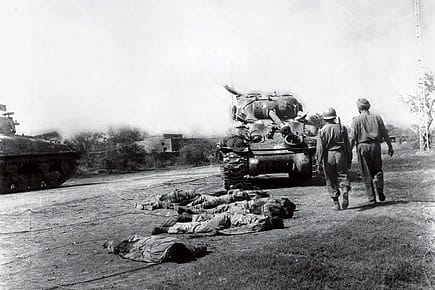Those Brave Men in Olive Green

1965: Stories from the Second Indo-Pak War by Rachna Bisht Rawat is one among a spate of retellings of the Indo-Pakistan War of 1965. Written at the behest of the Indian Army, it aims to commemorate the bravery of those who fought that September 50 years ago.
What makes Rawat's book stand apart is its noticeably anecdotal, 'fireside storyteller' style. Rawat, 45, is a journalist and 2005 Harry Brittain fellow, also winner of the Commonwealth Press Quarterly's Rolls Royce Award. From an Army family herself, she laces the perspective of an insider with sound journalistic research skills. This has mixed repercussions for the book. While her access to the inner circle allows her to make an intimate and engrossing telling that draws you into the stories right from the first few words, the book does not explore the disturbing (and inevitable) questions of war—its necessity or futility, and who actually won it. In the case of this war, both India and Pakistan claim victory and maintain varying records of civilian and soldier casualties. While Rawat makes sure her book mentions these figures, India's Minister of Defence Manohar Parrikar, who has written the 'Foreword' to the book, says that the Indian Army 'gave a befitting reply to the Pakistan invasion and ensured a resounding military victory for the nation.'
The author has tried to be more objective. In her 'Introduction', she says, 'When you read it, I just want you to remember that there are many versions of history and what we read is not always what actually happened. War accounts are often exaggerated and overemphasised. I have tried to avoid doing that. These battles are narrated by those who fought them, so I feel this is the closest we could have got to the truth.' The truth is from the Army's perspective: Rawat concludes the book with a chapter on the Tashkent Declaration, which is just short of rueing the diplomacy that forced the Indian Army to relinquish its hold on land that it had sacrificed lives to defend.
Imran Khan: Pakistan’s Prisoner
27 Feb 2026 - Vol 04 | Issue 60
The descent and despair of Imran Khan
Rawat is a terrific storyteller. The book is no cold recounting of history, not a bookish listing of dates and places, nor a corpse and medal-count. Rawat describes the five major battles fought by the Indian Army in September 1965 (at Haji Pir, Asal Uttar, Barki, Dograi and Phillora), reconstructing events in visual detail with the Army's own hand-drawn maps, old photographs and urgent, vivid descriptions. Her research is gleaned from War Diaries and archival records of United Service Institution of India: Centre for Armed Forces Historical Research, New Delhi, but more interestingly, interviews with relatives of dead soldiers and war veterans—those who survived to tell the tale. Chapters also feature the specific heroes of the battles, who led and inspired victory and were later decorated for it. These portions include engaging personal, even quirky details of the men's lives—their homes, families, sometimes even pets.
Humane, sometimes dramatic, anecdotes punctuate the gory battle sequences. Like how five officers during the battle of Haji Pir passed around a toothbrush that only one of them had remembered to carry. After which they sat down with their men to eat two mountain goats that the men had killed, only some of it flavoured with leftover salt. Or Brigadier Kanwaljit Singh (who tells the tale of Barki), recounting the day after the battle, when, sitting in a trench parched with thirst, he asked a jawan to bring him some water. The man dipped a glass into the nearby stream (which was the last source of water) and offered it to him. Singh realised that the water was reddened with the blood of recently killed soldiers and animals, but lifted it to his lips anyway.
Rawat says in the 'Introduction' that she researched, travelled, interviewed and wrote the book in four months flat. Penguin India's editor, Arpita Basu, read and edited chapters even as Rawat scripted them. They burnt the midnight oil, but got it done. Perhaps the immediacy and speed of the writing and production process has added to the urgency of the narrative. But might the book have expressed a more layered perspective if there had been more time between writing and rewriting? 'However, [the Tashkent Declaration] did nothing to limit Pakistan's guerrilla attacks in Kashmir and their interference continued.' Kashmir is a disputed territory and there are other points of view on 'interference' in the state.
Still, it is both an honest and engaging attempt by the 'men in olive green', as Rawat affectionately refers to them, to reach out to civilian readers who may not know what it really took to defend India's borders fifty years ago. This book is an engrossing—indeed, important—one about the theatre of war and its heroes.
(Chatura Rao is the author of Meanwhile, Upriver)
